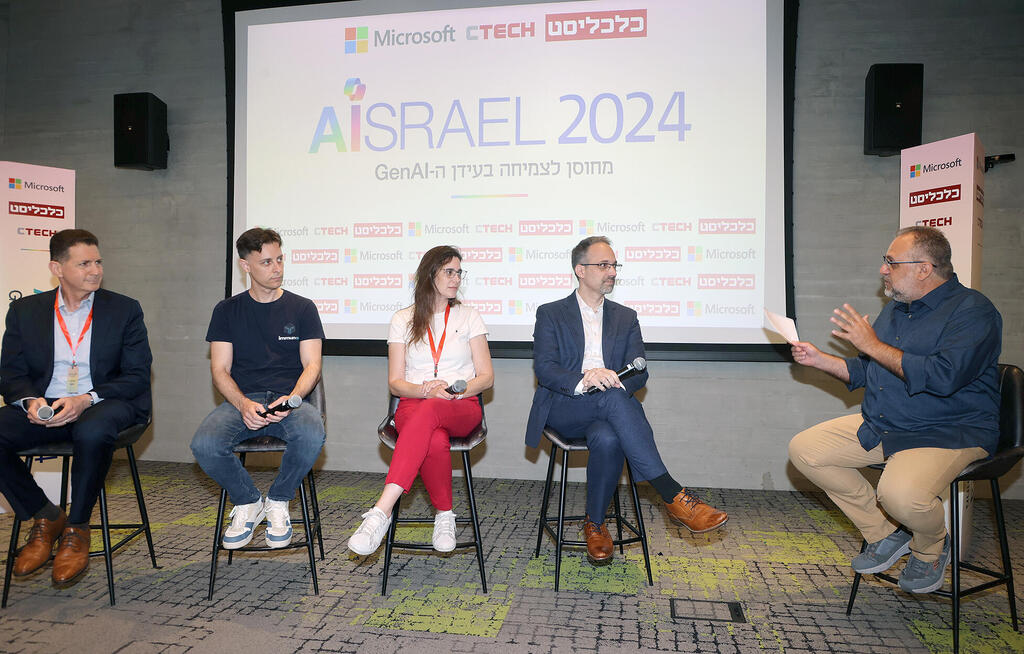
"Israel is a beacon for the world of advanced technology and AI in health"
Prof. Ran Balicer, Chief Innovation Officer at Clalit Health Services was speaking at the AIsrael conference on a panel on the impact of the AI revolution on the world of medicine. Prof. Eyal Zimlichman, Chief Transformation Officer & Chief Innovation Officer at Sheba Medical Center: "At the national level, the next decade must be dedicated to the field of artificial intelligence in healthcare"
"The State of Israel is clearly a world leader in the field of AI in medicine and health systems," said Prof. Ran Balicer, Chief Innovation Officer at Clalit Health Services, speaking on a panel on the impact of the AI revolution on the world of medicine and health at the AIsrael conference. "If we don't make a significant national investment It will be very difficult to stay in the lead in this race. Israel is one of the few places in the world today that when you go to the family doctor, they see on the screen every morning the output of conclusions from AI systems that go through the entire medical file and give insights such as who to call in proactive or preventive medicine based on prediction models for treatment based on the diseases people will have in the future. The system goes through the entire medical file and enters algorithms that say what the ideal treatment is for that condition. There is no other health system in the world that does this on a daily basis as Clalit does and we are at the forefront, but each week the technology is updated and we need national support and additional resources."
1 View gallery


AIsrael health panel (from left) Prof. Eyal Zimlichman, Noam Solomon, Daniella Gilboa, Prof. Ran Balicer, CTech's Elihay Vidal.
(Photo: Yariv Katz)
Where is the state in terms of investments and regulation?
"The gaps are getting narrower," says Prof. Eyal Zimlichman, Chief Transformation Officer & Chief Innovation Officer at Sheba Medical Center. "Israel has three advantages: in the field of data, in human talent, and in the regulation that allows it to be done. But we must declare at the national level that the coming decade must be dedicated to the field of artificial intelligence in health, as the last decade was in cyber. We need to make specific investments also at the level of human talent to go to the health sector, continue to produce regulation that is one step ahead of the world and give the appropriate incentives.
What is the advantage of Immunai as an Israeli company?
"We have been building a platform for mapping the immune system for almost six years," says Noam Solomon, CEO of Immunai. "Our immune system is the basis of everything that happens to us - health, illness, aging - and when we understand it better, we can help people stay healthier and find good medical treatments. We work with pharmaceutical companies to help speed up the drug development process. The headquarters, the main laboratory and business development are in the United States, but we have about 80 people in Israel and there are many advantages here such as the human capital that includes a very high entrepreneurial element and thanks to this we are making great progress."
Do you also feel a unique advantage and national pride in AIVF?
"We are optimizing vitro fertilization treatments using AI and the Israeli angle is very deep-rooted with us, because Israel is not only a startup nation but also an IVF nation. It has no equal in the world," says Daniella Gilboa, co-founder and CEO of AIVF. "The treatments here are subsidized by the HMOs up to the age of 45 and people can do IVF until they succeed, compared to the United States where treatments can reach tens of thousands of dollars and most people give up on the dream of parenthood. I came through the Beilinson laboratory. We have a database and an internal drive of people that are hard to find elsewhere in the world. A technology that optimizes IVF and touches a great many people in the world must be an Israeli technology."
Where did the pandemic and the events of October 7 meet you at Sheba?
"The Sheba Medical Center was very involved in the initial treatment of the wounded, especially in the fields of rehabilitation," says Zimlichman. "We realized at a very early stage that the main challenge was going to be mental health rehabilitation and already on October 8 we started looking for solutions that would allow us to significantly increase the capacity to treat many wounded people who will need rehabilitation and mental health victims. For example, we used artificial intelligence to give feedback to an injured person who is exercising, which allows one physical therapist to treat four times more patients. In the field of mental health, we developed an avatar with Microsoft and KPMG that sets up a full conversation with each post-trauma victim to diagnose them and there is a 94% accuracy with the psychiatrist. The avatar identifies the severity of the disease and suggests the treatment."
Is there a barrier that stops the people from opening up in front of a machine?
"We did research and when we asked the patients how they felt in front of the machine, a lot of data in the field of empathy shows that the machine received a higher score."
Balicer provides an example. "People don't know they have hepatitis C virus until they are tested. Every year we do screening tests for at-risk populations and out of 50,000 tested, 38 are positive and receive treatment. We used artificial intelligence against the silent disease to find small changes that cannot be seen with the human eye and identify the people at risk. Of the 500 people we tested, 38 were found to be positive, which means that we are generally 100 times more effective in identifying people with the disease that causes cancer and liver cirrhosis. Israel is a beacon for the world of advanced technology and AI in health, and it is not only a health event but an event of national resilience. Our ability to be perceived in the world as a beacon of science and innovation, health and technology is part of the way in which the State of Israel today needs to restore its status in the international community."
What are you doing to bring talents to the world of medicine?
"After the coronavirus, there was a change in perception among many people who are looking for something with an impact," says Gilboa. "When you touch a patient you do something real to people's lives and the value of that is tremendous. It brings a lot of good people." Solomon adds, "Engineers are a highly sought-after workforce in Israel. Our ability to win in this matter in the long run is to convince people who come from the very profitable fields of engineering that the fields of medicine and biology are very interesting and we need to think about how to encourage people to come. Once those engineers come to us, they stay because of the significance and quality of the team.
"Everyone talks about generative AI as if artificial intelligence is only the ability to organize text, we are dealing with science that reads mRNA from immune system cells. It requires years of research and is expensive. We raised close to $300 million and I would like the state to understand that it is absolutely necessary to keep the local talent here, as well as do deep research and development, something in which Israel can be number one in the world."













